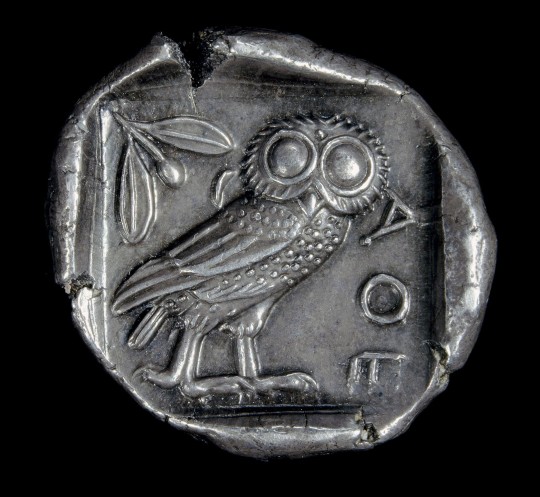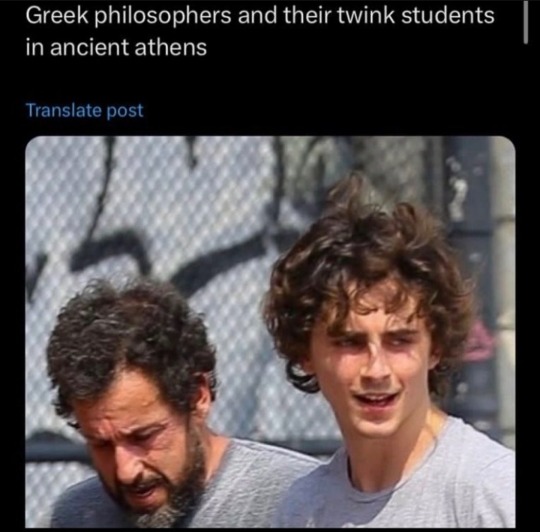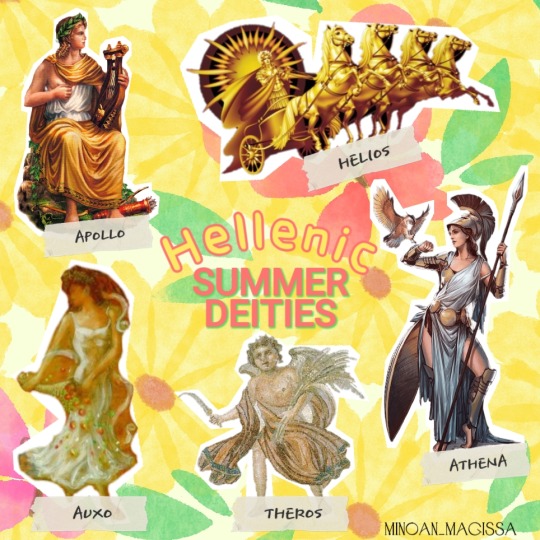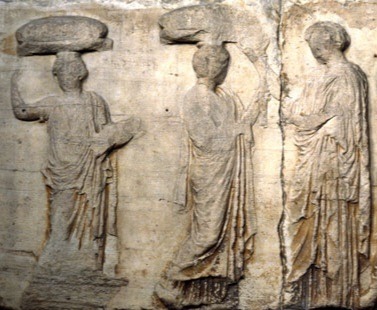#ancient athens
Text

November Athens under the moonlight. Photo by Michael Liaroutsos.
#greece#europe#travel#acropolis#night#city#cityscape#moon#night photography#landscape#ancient athens#ancient greece#ancient ruins#central greece#athens#attica#sterea hellas#mainland
1K notes
·
View notes
Text

Reverse side of an Attic silver tetradrachm (τετράδραχμον, 'four drachmas'), depicting the owl of Athena facing forward, with the abbreviation ΑΘΕ (ΑΘΕΝΑΙΩΝ, 'of the Athenians'), indicating the coin's origin. Such coins were often referred to as glaukes (γλαῦκες, 'little owls') and became widespread throughout the Aegean during the 5th century BC as Athenian dominance over the eastern Mediterranean grew.
🏛️: © The Trustees of the British Museum
#classics#classical antiquity#classical greece#ancient greece#ancient greek#greece#greek#ancient history#athens#ancient athens#athena
378 notes
·
View notes
Text
Imagine being a oracle in the ancient world, given visions of a future you cannot know. Everyone comes to you asking about things that matter to them, wars that will be won or lost, children that will be born. But you're cursed to see further then that. You see things you can't comprehend, a billion possible futures branching out from every momment. You can see the temples of the gods laying empty and barbarians ravaging the known world. You can see man made horrors beyond your comprehension, empires larger then anyone could imagine. You know of artifical intelligence, or nuclear war, of climate change. And you can't even describe any of it to most people. Starships fighting over black skies, humans twisted apart and put back together by machines, and nobody around you can even try to know.
Most people prefer false oracles, that tell them only of things they understand. While you only discuss what you know with a few scholars and philosophers who are terrified to understand the futures you can see.
#196#my thougts#fantasy#history#oracle#my writing#ancient athens#ancient greek#ancient rome#ancient greece#magical realism#magic#short fiction#flash fiction#horror#psychological horror#science fiction
154 notes
·
View notes
Text

I drew Alcibiades on my stats class notes yesterday. I think he looks beautiful🥰
#my art#alcibiades#ancient greece#ancient athens#oh and I’m also wearing my alcibiades shirt rn for good luck on my Greek midterm🍀
259 notes
·
View notes
Text
Time Travel Question : Assorted Performances I
These Questions are the result of suggestions from the previous iteration.
This category may include suggestions made too late to fall into the correct grouping.
Please add new suggestions below if you have them for future consideration.
#Time Travel#Drama History#Ancient Athens#Ancient Greece#Hegelochus#Euripides#Orestes#Aristophanes#Dionysian Festival#Aeschylus#Lost Literature#Ancient Greek Literature#Oresteia#Homer#Classical Athens#Music History#Ancient World#Enheduanna#Ur#Sumerians#Ancient Egypt#Sappho#Epidaurus
107 notes
·
View notes
Text

#greece#ancient athens#adam sandler#timothee chalamet#idk if that's actually him but i feel like he looks like that
322 notes
·
View notes
Text


went to a starbies to work on my essay with a. few friends (don’t mind how bad it is — it’s my “shit draft!”), and then did some more work on the go.
#studyblr#classics#classics major#latin#study inspo#academia#dark academia#classics studyblr#latin translation#the secret history#ovid's metamorphoses#roman athens#archaeology#architecture#material culture#ancient athens#studying#study blog#study aesthetic#classics aesthetic#classics student
159 notes
·
View notes
Text
Okay so my mom gave my daughter some books she got from the flea market. Considering how my mom let us watch a ton of inappropriate movies and shows when we were kids, I probably should've checked them before I let my daughter pick one for her bedtime story tonight, but hindsight is hindy and sighty.
Anyway, I couldn't stop giggling when I read her the story about Theseus because this is the most UNHINGED MINOTAUR I HAVE EVER SEEN

First of all, Theseus reminds me of both the knifer and the knifee from that wikiHow "Winning a Fair Fight" meme. Second of all, I know that Ovid described him as "part man, part bull" so this is technically correct, but... wowzers.
Eh, it was either this or a short story about Grendel's bone-crunching ass.
#greek mythology#greek myth art#greek myth memes#greek myth retellings#ancient athens#ancient crete#minotaur#theseus#winning a fair fight?#bedtime stories#lola gives the weirdest gifts sometimes#real life#parenting#flea market finds
64 notes
·
View notes
Text
Summer Solstice Deities and Festivities

Summer Solstice/Καλοκαίρι/Θέρος/ Litha Blessings to my Northern Hemisphere friends! 🌞
Today also happens to be Arrephoria (Ἀρρηφόρια), a festival in honour of Athena. More on that later in the post!

Some info about the summer-related deities in the graphic:
☀️Auxo (Αὔξω) is one of the Horae (Ὧραι), and the goddess and personification of summer. She is also a protectoress of vegetation, growth, and fertility.
☀️Theros (Θέρος) is another personification of summer and is usually depicted as a winged boy holding an ear of grain in one hand and a sickle in the other. Theros is the word for summer in Ancient Greek.
☀️Athena (Ἀθηνᾶ) is the Olympian goddess of wisdom and warfare. Her main festival is the Panathenaia, which was celebrated during Hekatombaion in midsummer. The solstice also starts off with Arrephoria. Sinoika is yet another celebration during the summertime that honours her.
☀️Apollo (Ἀπόλλων) is the Olympian god of sunlight, healing, music, and poetry.
☀️Helios ( Ἥλιος) is the Titan god and personification of the sun. He is also the god of eyesight and oaths.
What I Did Today

I decorated my altar for the solstice and featured summer deities on the center of it.

I ate a (mostly) Mediterranean meal outside in the sunshine: kalamata olive spread, anaheim peppers, & extra virgin olive oil on gluten-free toast, gigantes beans with feta, and Persian cucumbers sprinkled with Greek oregano and paprika. 😋
I also did a lot of research to put together this post. That honestly took up most of my day. 😆
And now onward to Arrephoria!

Arrephoria (Ἀρρηφόρια) stems from the words "ἀρρητον" (mystery) and "φέρω" (I carry/bring). It is a midsummer fertility festival that honours Athena and takes place on the first day of the Estival Solstice.

In Ancient Athens, two young girls from aristocratic families were elected to reside as arrephoroi (άρρήφοροι: virgin acolytes of Athena Polias) at the Arrephorion on the Acropolis for a year at a time. Their main responsibilities included maintaining Athena's sacred olive tree and with the aid of other women, weaving Athena's new peplos.

On the evening of Arrephoria, the girls donned in white clothing placed what Athena's priestess gave them (a mystery item in closed chests) atop their heads. Then, they both carried the chests down (without looking at the items) to the temenos (τέμενος: holy grove) of Aphrodite via a concealed stairway inside the north wall and proceeded to carry something else (possibly dew from the spring) back up to the Acropolis.
With Hekatombaion (the 1st is the Athenian New Year) around the corner, Arrephoria also served as a "tying up" of the old year, ensuring nothing was carried over into the new one.
What you can do for Arrephoria:
📑finish any unfinished projects
👕declutter (i.e. donate clothing you no longer need)
🧹if you didn't clean your altar(s) for Kallynteria, now is the time to do it
💧pour a libation of dew or water for Athena
🍱have a hearty feast and offer some to Athena
*Kallynteria and Plynteria were two rituals that prepared for Arrhephoria.
The myth the ritual itself is based on:
Kekrops (Κέκροψ), the first mythical king of Athens, had three daughters named Aglauros (Ἄγλαυρος), Erse (Ἕρση), and Pandrosos (Πάνδροσος) - each name referring to dew. One night, Athena gave them a closed basket. While she forbade them to open it, Aglauros' and Herse's curiosity got the better of them, so they took a peek, only to see a baby (Ericthonios, Hephaestus' mysterious son).

Seeing as they broke her trust, Athena punished them by making snakes appear out of the basket, merely to scare them. Startled, the two girls jumped off the Acropolis and met their untimely demise.

Pandrosos didn't partake and was spared. Eventually, a shrine was errected in her name (located next to the sacred olive tree). Therefore, on Arrephoria, Pandrosos (in addition to Athena) were commemorated, and the two arrephoroi fulfilled the unfinished duty of the other two.
Sources: "Girls and Women in Classical Greek Religion" by Matthew Dillon, Hellenion.com: Arrephoria, Archaeology.org: Acropolis Arrephorion Restoration
#summer solstice#summer#midsummer#litha#arrephoria#athena#ancient athens#hellenic polytheist#hellenic pagan#hellenic polytheism#hellenic religion#greek mythology#hellenismos#ancient greece#theros#athena devotee#athena devotion#Spotify
143 notes
·
View notes
Photo

Large Black-Figure Belly Amphora with Chariot and Hoplites
From the circle of the Lysippides Painter.
Terracotta.
C. 540 BC.
The A-Side depicts a chariot with two galloping black horses to the right, a bearded charioteer wearing a long white chiton (beard and hair outline in white) and a warrior in wide stepping position standing on the shaft (helmet, short chiton and round shield with red inside). Behind the horses a warrior is hurrying to the right, looking back; he is wearing a helmet, a cuirass and a pair of greaves. In front of the horses, another warrior is moving to the right and looking back; he is wearing a short chiton and red greaves.
On the B-side, a young charioteer in long white chiton with a red shield on his back stands on a chariot with resting horses. The horses are black except the third one. The white horse with red pupils and mane outlined in red. Behind the horses a warrior stands to the left and in front of them, a short youth with a long hair, mainly red, walks to the right.
H. 41 x Ø 27 cm.
#Large Black-Figure Belly Amphora with Chariot and Hoplites#The Lysippides Painter#C. 540 BC#pottery#terracotta#ancient artifacts#archeology#archeolgst#history#history news#ancient history#ancient culture#ancient civilizations#amcient greece#ancient athens#greek history#greek art
97 notes
·
View notes
Text
That anyone believed the Gimbutas 'Goddesses fix misogyny' thesis when Ancient Athens is a thing is incredible, and Athena is precisely why:
And last, before moving into the realities behind all the literary elements, but most revealing of all for how little the Goddess actually mean in debunking misogyny at the time.....Athens was named after Athena, its patron Goddess. Athens, mind you, the most infamously misogynistic part of ancient Greece. Its entire founding myth roots it solidly in choosing to be Athens instead of Poseidonopolis, and yet that myth made it the most blatantly misogynistic society in the Ancient world in Western Eurasia, rivaled only by Imperial China in the East.
Athena Herself is a Goddess of many factors, but not least among them is being the ever-victorious guardian of strategic war, not the BLOOD FOR THE BLOOD GOD variety. That was Ares' prerogative, and why Ares was despised everywhere in Greece....save Sparta. Equally ironically Ares is also the only deity in Classical myth who actually had legitimate respect for women (hence one aspect of Aphrodite leaping into His arms) which has its own effects on the city that worshiped Him as Patron....Sparta.
#lightdancer comments on history#women's history month#classical greece#greek mythology#the goddess in theory and practice#athena#ancient athens
14 notes
·
View notes
Text
I often think of how magnificently annoying Socrates must have been
#imagine you are ion and he is trying to tell you shit about reciting poetry#i would explode tbh#he is the well actually… guy#philosophy#ancient philosophy#Socrates#ancient athens#classics#Plato
39 notes
·
View notes
Text
Not the ancient Greeks making a very tall but handsome woman cosplay as Athena in order to trick Athens into accepting a tyrant (rumored to be gay or at least bi) who was also having anal sex with his 2nd wife to avoid her getting pregnant with a cursed child (because he believed her side of the family was cursed)....

The shit I learn when doing research for a paper that has nothing to do with any of this but here we are....Thanks Herodotus, that was irrelevant but I appreciate the historical lesson on avoiding cursed children....
#ancient greece#ancient Athens#ancient history#herodotus#Athenian tyrants#pisistratus#Athenian tyrany#Athenian tyrant Pisistratus#Peisistratos
14 notes
·
View notes
Note
Dr. Reames!! Oftentimes I see it mentioned that Alexander’s Persian campaign was framed at the time as a revenge against Persia for previous wars against Greece. And so, for example, the burning of Persepolis could be interpreted as payback for the burning of Athens.
But how accurate is that actually? I can only suppose that the top echelons of the Macedonian military establishment didn’t really feel that strongly about Greece as a whole (as Greece wasn’t a unified country like today), but had to frame it as such to disguise what could be seen as a shameless offensive land grab.
Even so, Alexander knew his propaganda. Was there a general feeling among the people of Greece and the rank and file troops that this campaign was a revenge for the previous wars Persia waged against Greece? Some sort of unifying spirit, ideal? And Alexander exploited this for his benefit? Or is this idea of a Greece vs Persia conflict a complete fabrication of misinterpretation?
The idea of a “Revenge against Persia” campaign was part of 4th century political discourse before Alexander, or even Philip. The question was who would lead such a campaign? Naturally, Athens thought they should, but after their defeat in the Peloponnesian War, didn’t have the military mojo. And even if Sparta had opposed the Persian invasion (alongside Athens), she owed her success in the Pel War to Persian assistance, so that was a problem. Thebes as a potential leader was even worse, as she’d Medized (went over to the Persians), so hell-to-the-no would she be appropriate.
Isokrates was probably the first to suggest it be Philip, as his star was rising. Yes, Macedon had also Medized, but Alexander I had been a clever man who played both sides against the middle and was able to burnish his rep after the war as “having no choice, and see? I helped Athens by providing her with timber for the Greek fleet”…if at, we’re sure, a substantial sum that benefited Maceon. But Macedon resented Persia too and had been a victim! It provided the plausible deniability needed to elevate Philip as leader of the Go-and-get-Persia campaign.
Of course Athens was not keen on this. She still thought SHE should be leading the vengeance war, as she won the two most significant battles of the Greco-Persian Wars (Marathon in #1 and Salamis in #2). That Philip was out-maneuvering her at every turn for the hegemony of greater Greece was additionally galling.
When Philip decided to invade Persia is a point of great contention, but I think he had it in mind by the time of his extensive Balkan campaign (c. 341/40/39. when Alexander was left in Pella as regent). Much of that was to secure the Black Sea coast and conquer Perinthos and Byzantion (Athenian allies) in order to secure a bridgehead to Asia. He may have believed that the Athenian Isokrates’s oration letter to him was indicative that Athens could be won over as an ally, in order to provide the ships he needed but didn’t have. He knew Demosthenes a problem, but may not have believed fear of/resentment against Philip himself would unite Thebes and Athens (inveterate enemies) to oppose him at Chaironeia.
But that’s how it went. Philip won anyway and created the Corinthian League, whose purpose was the invasion of Persia and vengeance for the earlier Persian invasion of Greece. Was that Philip’s primary motivation? Oh, hell no. He wanted the MONEY/loot (and glory). But a campaign of retribution put a better face on it, and justified his usurpation of the Athenian navy, which he absolutely had to have to be successful.
When Philip was assassinated, Alexander simply took up where his father left off. He literally told the Corinthian League (when he reconvened them not long after Philip’s death), “Only the name of the king has changed….”
So yes, the propaganda wasn’t invented by Alexander, or even by Philip, but they used it to very good effect, as it allowed them to demand allies (and BOATS). Alexander didn’t dissolve the alliance and release those troops until after Darius’s death. And even then, he offered good pay to stay on with the rest of his conquests (which many did).
#asks#philip ii of macedon#Philip of Macedon#Alexander the Great#ancient Macedonia#Greco-Persian Wars#Alexander's campaigns#Isokrates#Isocrates#ancient Athens#Greek revenge campaign against Persia#Classics
9 notes
·
View notes
Text

I’m so happy everybody liked the sketch😭I wasn’t planning on rendering it but here he is. I love how Alcibiades brings us together💖
107 notes
·
View notes
Text
„We tend to speak of Greek marriage during the classical period as if there existed such a thing as the institution of marriage with a single well-defined legal form. We have_ to read the texts of the orators to see that in a city such as Athens the situation was by no means-so simple. The status of a legitimate wife - whether she was referred to by the old word of damar or the more technical expressions of gamete gune or gune enguete - involves a number of factors not one of which, taken on its own, constitutes a decisive, unequivocal criterion.
The essential element of-marriage at this time-is the engue. The engue turns the union between a man and a woman-into a social action whose effect reaches beyond the two individual� involved to seal, through them, a commitment between two domestic households, two "houses." The engue binds them to each other by a mutual, public, and solemn agreement sworn in the presence of witnesses who can act as its guarantors. Demosthenes cites· a law that defines the gnesioi, or legitimate children, as those "who are the issue of a woman given through engue by her father, blood brother or paternal grandfather." And yet the engue does not, in itself, have the force of constituting a marriage. It is a necessary element in marriage but not its sufficient condition. In this connection we need only recall the well-known example of Demosthenes' father: Before his death he promised his wife by engue to one of his nephews and his daughter, aged five, to another. Neither of these marriages was ever consummated and the engue by itself provoked no legal consequences. In neither case was it necessary to nullify or break the link it was supposed to have established. If the engue was not followed by cohabitation between the woman and her husband it had no· effect. Similarly, we notice that the act of handing over the daughter by her kurios, the relative who has the authority to arrange her marriage, is not definitive.
The act of handing over, or ekdosis, consists in the transfer of the woman from one kurios to another, from the qualified relative to the husband. The nature of this transfer is not absolute; it does not sever once and for all the links between the daughter and her family of origin; it is valid for· the duration of the period of cohabitation and for predetermined purposes, in particular the procreation of children. The act of giving the daughter is associated with presentation of the dowry, the proix, a practice introduced after the time of Solon that, in the classical period, had the force of a legitimation, testifying that the daughter had truly been settled by her oikos in the family of her spouse. However, the dowry was no more irreversibly made over to the husband than was the daughter. It was composed of movable chattels, usually in the form of cash the value of which was decided in the presence of witnesses, and, although it was presented to the husband, it remained attached to the daughter throughout her matrimonial career, acting as a kind of link with her original home. If the marriage broke down the dowry was returned, together with the daughter, to the man who gave her away, or, failing this, to his representative. In a sense, it remained at the disposal of the daughter to be used for a new marriage.”
This system may, at first sight, appear quite strict. A legitimate wife was one who, after an engue, had been given together with her dowry by her kurios to her husband. The proix was the tangible sign of the alliance between the two houses. … However, a text from Isaeus shows that a girl could be installed with a man as a concubine, pallake, by the member of her family who had authority over her, and this relative fixed in advance the payments that had to be made to him in return. The opposition ·between legitimate wife and concubine was not as clear-cut on this point as it seemed.”
- Myth and Society in Ancient Greece by Jean-Pierre Vernant
10 notes
·
View notes